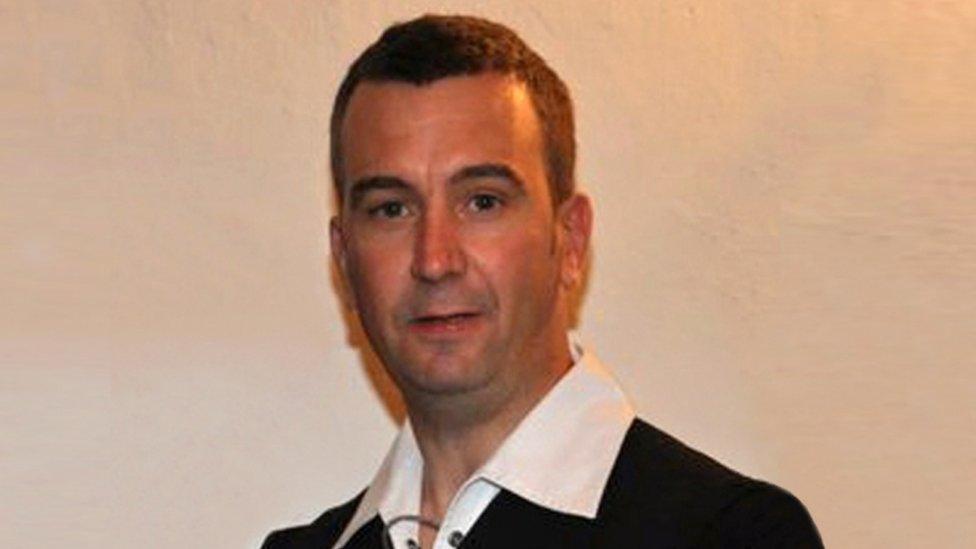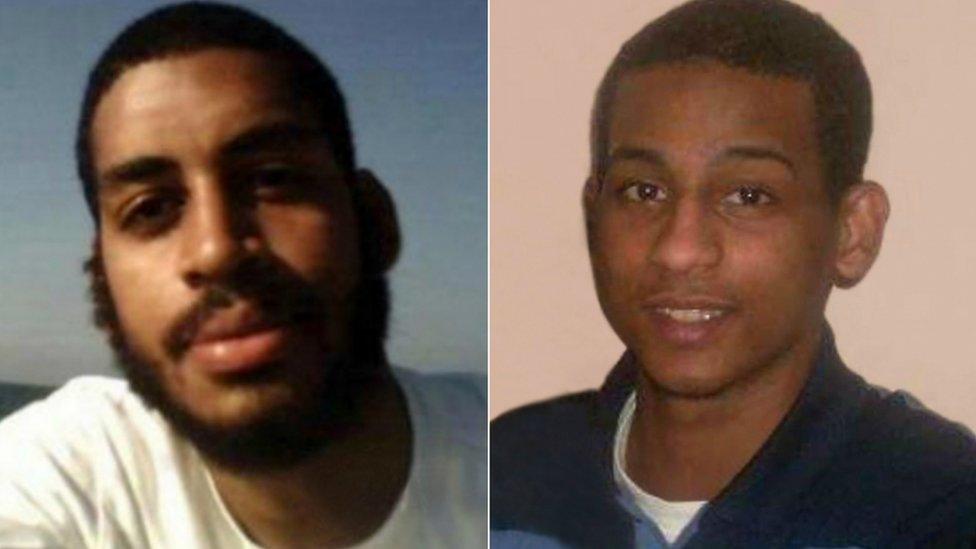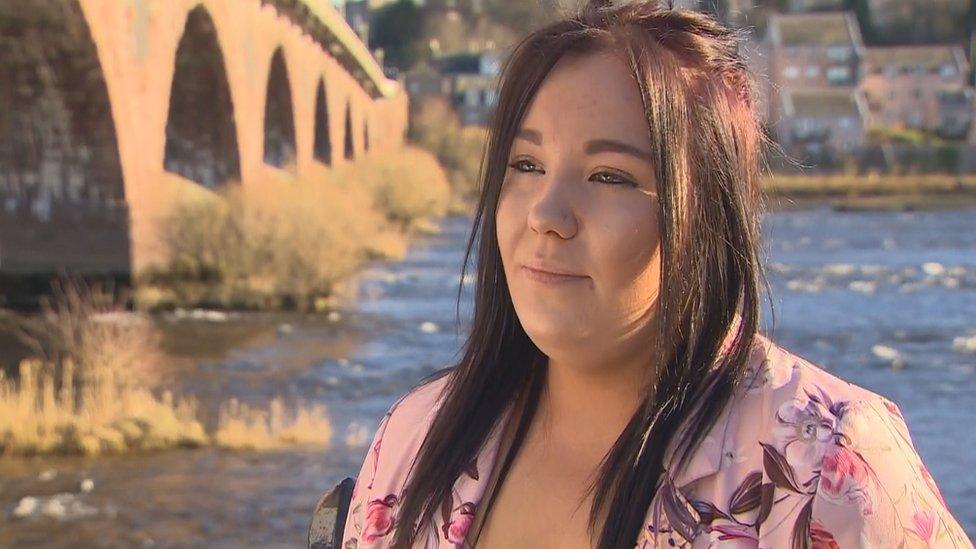IS Beatles 'should die slow, painful death'
- Published
Bethany Haines said the men should face justice for her father's murder
The daughter of a Scottish aid worker who was beheaded by the Islamic State group in Syria has said she hopes his killers die a "slow, painful death".
David Haines was murdered by the so-called "Beatles" cell of four British militants in 2014.
It was announced on Thursday that the two remaining members of the cell had been captured by Syrian Kurdish forces.
Mr Haines' daughter, Bethany, told BBC Scotland that she wanted to look the men in the eye if they stand trial.
She said she had initially been sceptical when she heard rumours that Alexanda Kotey and El Shafee Elsheikh had finally been captured, but realised it was true when she received a breaking news alert from the BBC.
She said: "I was completely in shock. I didn't know what to feel, I didn't know what to think and then you kind of realise it's real and you think that's it, they're gone, they can't hurt anyone else."
Alongside Mohammed Emwazi and Aine Davis, the pair are thought to have been responsible for gruesome IS videos in which Emwazi - who became known as Jihadi John - taunted Western powers before beheading hostages.
Drone strike
Their victims included Mr Haines, a 44-year-old father-of-two who had been working for a French aid agency when he was kidnapped in Syria in March 2013.
Emwazi was killed in a US drone strike in Raqqa in 2015, while Davis was jailed on terrorism charges in Turkey last year.

Mr Haines was working for a French aid agency when he was captured by Islamic State militants
Ms Haines said her personal opinion was that the two captured members of the group should die a "a long, slow, painful death", but acknowledged that was unlikely to happen.
She said: "The best thing for them is to be locked up and throw away the key. They should never be allowed back in society because they will just recruit people and they will do this again.
"If it goes to trial I will certainly be there. I will look them in the eye and let them know that I am who I am, and they have destroyed a big part of my life.
"Hopefully there will be some sort of justice. I would hope they would show some sort of remorse, seeing the families and seeing the people they have actually affected."
It is understood that Kotey and Elsheikh have been stripped of their British citizenship, but the Home Office says it cannot comment on individual cases.
Officials quoted by US media said the two men had been captured by members of the US-backed Syrian Democratic Forces (SDF), who are targeting remnants of IS.

Alexanda Kotey, left, and El Shafee Elsheikh were the last two members of the cell at large
Mr Haines was the third Western hostage - and first Briton - paraded on camera by Islamic State.
US officials said the Beatles execution cell beheaded at least 27 hostages and tortured many more.
Their other victims included British aid worker Alan Henning, US journalists James Foley and Steven Sotloff and American aid worker Peter Kassig.
'Never get over it'
Ms Haines said the capture of Kotey and Elsheikh had brought back painful memories and emotions three-and-a-half years after her father was murdered on camera.
She said: "You never get over it, you just learn how to deal with it and how to manage the different emotions that play in your head every day.
"It does bring it all back - I remember seeing him in the orange jump suit.
"Those men were responsible for that, and they were responsible for the torture of these other hostages and for the deaths of quite a lot of men - I am actually friends with quite a lot of their families."

Ms Haines said the capture of the two remaining members of the cell had brought back painful memories of her father's execution
Who were the IS 'Beatles'?
Mohammed Emwazi - dubbed Jihadi John, was the masked militant from west London who featured in gruesome IS videos, taunting Western powers before beheading hostages. Victims who appeared in those videos included British aid workers David Haines and Alan Henning, US journalists James Foley and Steven Sotloff, and American aid worker Peter Kassig. The alleged ringleader of the group, he was killed in a drone strike in 2015 in Raqqa, the former de facto IS capital in Syria
Aine Davis, also from west London, was convicted of being a senior IS member and was jailed in Turkey last year on terrorism charges, after being arrested near Istanbul in 2015.
Alexanda Kotey, another west Londoner, took part in the torture of hostages, the US State Department says, external, and also acted as a recruiter for IS
El Shafee Elsheikh "earned a reputation for waterboarding, mock executions, and crucifixions", external while serving as the cell's guard, the US state department says
Mr Haines joined Acted to help co-ordinate the delivery of clean water, food and tents, in order to ease the growing humanitarian crisis in refugee camps near Atmeh, a town in northern Idlib province, near the Syrian border with Turkey.
He was staying with other aid workers in Atmeh when he was kidnapped alongside Italian colleague Federico Motka, who was later released.
Born in Holderness, East Yorkshire, Mr Haines was raised in Scotland and attended Perth Academy. His parents live in Ayr.
After leaving the RAF, Mr Haines worked for Scotrail, before beginning his career in humanitarian work.
His postings for international aid agencies took him to some of the most dangerous places in the world, and was said by his family to have "helped whoever needed help, regardless of race, creed or religion".